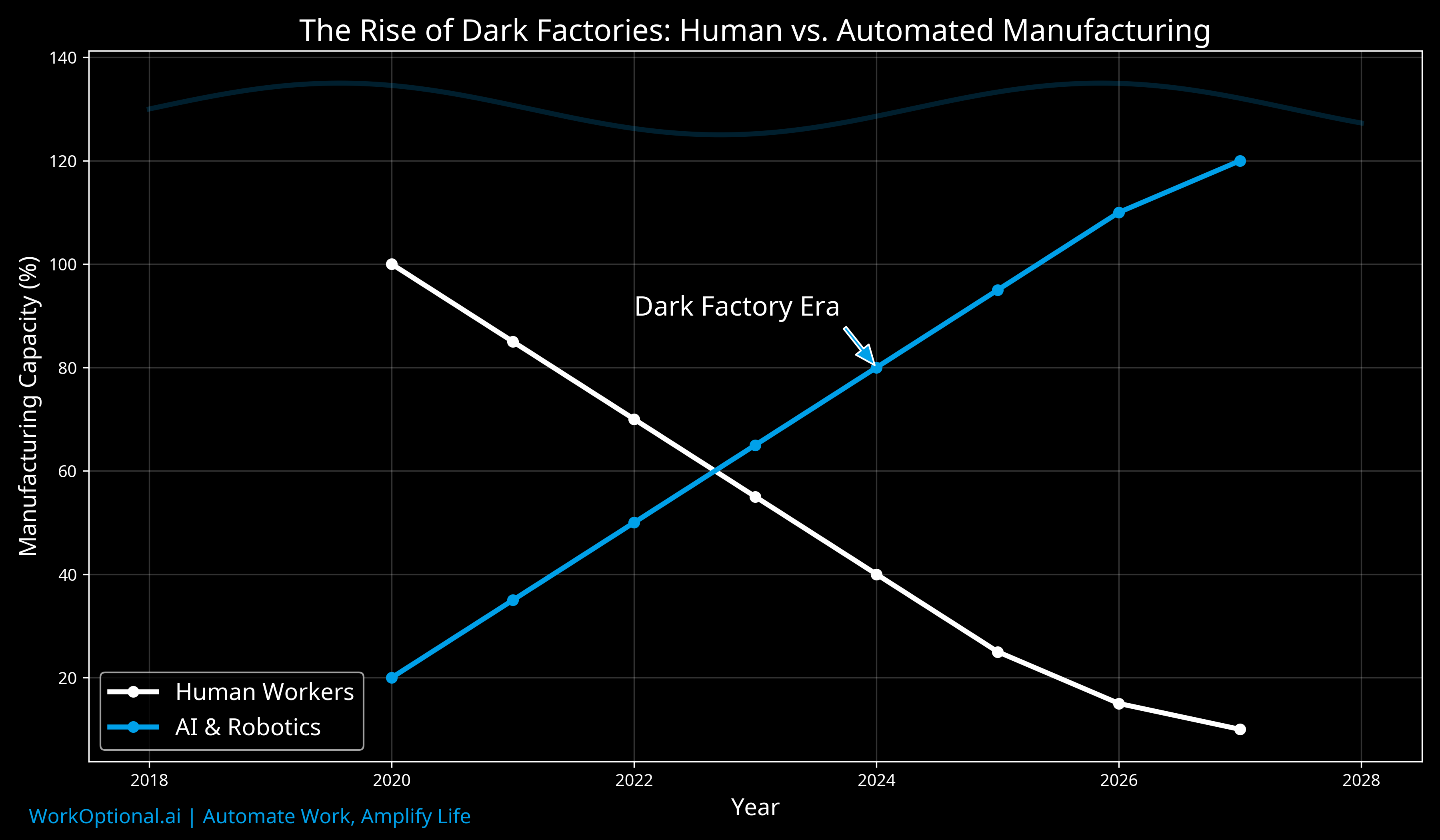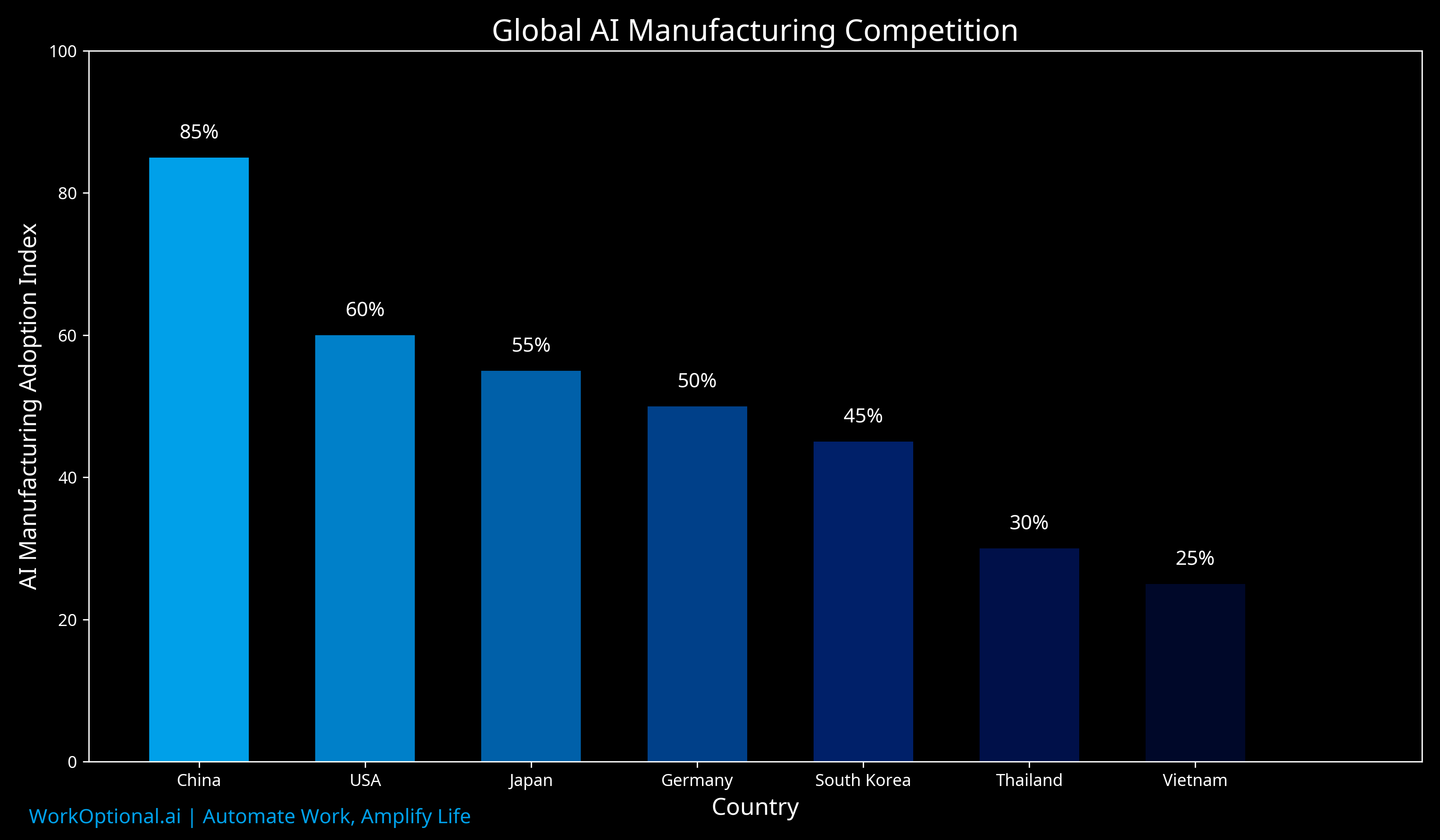- WorkOptional: Automate Work, Amplify Life
- Posts
- WHAT IF TRUMP'S TARIFFS AREN'T ABOUT JOBS, BUT ABOUT COMPETING WITH CHINA'S "DARK FACTORIES"?
WHAT IF TRUMP'S TARIFFS AREN'T ABOUT JOBS, BUT ABOUT COMPETING WITH CHINA'S "DARK FACTORIES"?
Trump, Tariffs & Dark Factories | Top 5 AI Stories | Upcoming Master Classes

What if there's more to Trump's seemingly chaotic China tariff war than meets the eye? Could these policies be partially driven by the need to compete with China's rapidly expanding network of "Dark Factories"—fully automated AI manufacturing facilities that operate without human workers? As countries with traditional labor forces increasingly struggle to compete, could reshoring advanced manufacturing be the only viable path forward?

Source: WorkOptional.ai analysis based on manufacturing automation trends data from International Federation of Robotics (IFR) Annual World Robotics Report 2024
On the surface, Trump's trade war with China appears erratic and impulsive. But what if we're missing a deeper strategic possibility?
Fully automated production facilities where robots and AI systems operate 24/7 without human intervention, often without even requiring lighting or climate control. Reports from Shenzhen and Shanghai describe massive facilities where products are assembled in darkness by tireless machines, with human presence limited to occasional maintenance.
This transformation raises a provocative question: What if Trump's tariff strategy isn't about bringing back human jobs, but about creating economic incentives for building America's own network of advanced automated factories? In an age of AI and robotics, the competitive advantage of cheap labor diminishes dramatically.
Tesla, under Elon Musk's leadership, has pioneered this approach in the United States. Their Gigafactories employ cutting-edge robotics and AI systems that dramatically reduce human labor while increasing productivity.
"The countries that master AI-driven manufacturing in the next decade will likely dominate the global economy for the next century," suggests Dr. Elaine Chen, manufacturing automation expert at MIT. "If the U.S. doesn't develop its own advanced manufacturing capabilities, it risks permanently ceding industrial dominance to China."

Source: WorkOptional.ai analysis based on data from McKinsey Global Institute's "Future of Manufacturing" report, 2025
This creates a fascinating duality: Countries like the US may have no choice but to reshore manufacturing to remain competitive, while AI and automation now make reshoring possible since cheap labor is no longer the primary advantage. The question becomes not whether manufacturing will return to America, but in what form.
For Southeast Asian nations, this shift poses an existential challenge. Thailand's Minister of Industry recently stated, "We cannot compete with fully automated Chinese factories on cost or efficiency using our current labor-intensive model. Either we embrace automation ourselves or we face economic marginalization." Similar concerns have been echoed by officials in Vietnam, the Philippines, and Indonesia.
Leading economists suggest Trump's tariffs might accelerate automation rather than bringing back human jobs. Carl Benedikt Frey, economist and professor at Oxford University, told TIME: "There's no reason whatsoever to believe that this is going to bring back a lot of jobs. Costs are higher in the United States. That means there's an even stronger economic incentive to find ways of automating even more tasks."
This creates a paradox: When labor costs are low, it's usually not economically viable to invest in expensive automation. But if tariffs force companies to move production to higher-cost countries like the US, the financial calculus changes dramatically, potentially accelerating automation.
Nobel Prize-winning economist Daron Acemoglu predicts: "Companies will have no choice but to bring some of their supply chains back home—but they will do it via AI and robots."
While this strategic interpretation is compelling, the actual implementation has been far from smooth. Trump's approach has been criticized as haphazard, creating unnecessary market volatility and diplomatic tensions. A more strategic approach would combine tariffs with targeted investments in automation research and workforce development.
This viral TikTok video mocks Trump's tariffs by showing "miserable Americans" working in factories. But there's a profound irony: China is already rapidly moving away from human production into Dark Factories. The scenes of human workers toiling on assembly lines are increasingly outdated in China itself, where automation is eliminating these exact jobs.
The true pressure of human factory work is now felt most acutely in Southeast Asian countries, where leaders have repeatedly expressed alarm about being "obliterated" by China's Dark Factories.
So the question becomes: Is this what Trump and his administration see? A future where manufacturing returns to America not with human workers, but with advanced automation that can compete with China's Dark Factories?
TOP 5 GLOBAL AI STORIES IMPACTING THE FUTURE OF WORK
Nvidia Faces $5.5 Billion Hit as US Restricts AI Chip Exports to China
Nvidia announced a potential $5.5 billion financial charge following new US restrictions on exporting its H20 AI chips to China, escalating the technological dimension of the US-China trade war.Stanford AI Index 2025 Shows US Lead Narrowing as China Closes Gap
Stanford University's annual AI Index reveals that while the US still leads in producing top AI models, China is rapidly closing the performance gap.Delta Electronics Thailand CEO: "US Customers Will Pay Trump's Tariffs"
Victor Cheng, CEO of Delta Electronics Thailand, stated that it will be US customers, not his company, who will ultimately pay for Trump's tariffs.China Deploys AI in Trade War Messaging Campaign
Chinese social media accounts are using AI-generated content showing Americans working in factories with slogans like "We don't back down," fueling tensions in the ongoing trade war.US States Accelerate AI Regulation with 131 Bills Passed in 2024
A new report reveals that US states have dramatically increased AI regulation, passing 131 AI-related bills in 2024.
WORKOPTIONAL.AI MEETUP EVENTS
Real Estate & PropTech Pitch Night
Wed | April 23, 2025 | 12:00 PM to 1:30 PM EDT | Online | Register HereMasterClass: How AI Will Make Homes Smart
Wed | April 30, 2025 | 9:00 PM to 10:30 PM EDT | Online | Register HereMasterClass: Automated Content Creation & Social Media Management
Wed | May 14, 2025 | 9:00 PM to 10:30 PM EDT | Online | Register Here
Forward this newsletter to friends who need to understand the future of work. Help them navigate the AI revolution.
To learn more, visit WorkOptional.ai and subscribe to our newsletter for insights, webinars, and work and investment opportunities.
San, WorkOptional

Reply